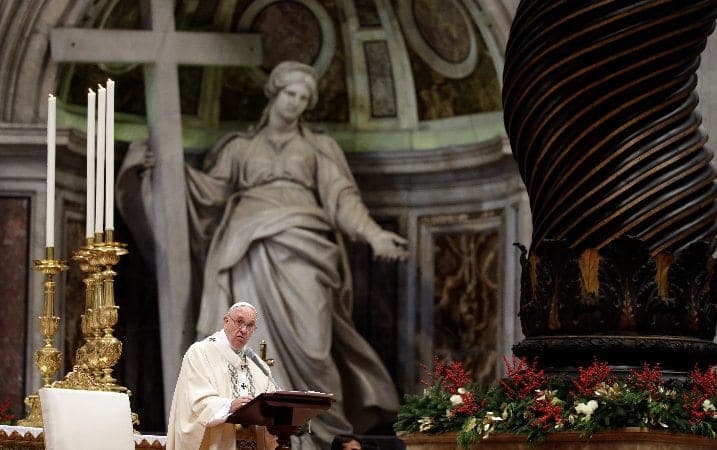ROME — Pope Francis closed out the holiday season Wednesday by calling Catholicism to a new sense of missionary hustle, urging the Church to reach out to all the peoples of the world and insisting that “mission is her vocation.”
“To proclaim the Gospel of Christ is not simply one option among many,” the pope said, “nor is it a profession.” Instead, Francis said, it’s the “very nature” of the Church.
“There is no other way,” he said.
To accomplish that goal, the pope said, requires Christians “to go forth, to leave behind all that keeps us self-enclosed, to go out from ourselves and to recognize the splendor of the light which illumines our lives.”
In other words, for 2016 Pope Francis seems to want a Church on the move.
The pontiff made the comments in his homily for the traditional Jan. 6 Mass of the Epiphany, a feast that celebrates the moment when the Christmas star led the Magi, or three wise men, to the infant Jesus. On the Vatican’s calendar, the feast of Epiphany is considered to mark the close of the holiday season.
Francis celebrated the Epiphany Mass in St. Peter’s Basilica.
By his call to “mission,” however, the pontiff made clear he doesn’t just mean hustling for converts, stressing in his homily that “to be missionary does not mean to proselytize.”
(In papal argot, “proselytism” generally signifies pressuring people to join the Church.)
His caution about mission being confused with proselytism also seemed to show in his noontime Angelus address on Wednesday, when his prepared text had the pontiff saying it’s the aim of the Church “to guide every man and every woman of this world, respectfully, toward the child who was born for the salvation of all.”
As he spoke, however, Francis changed the word “guide” to “indicate,” seemingly wanting to accent that the Church’s mission to spread the faith is an invitation rather than a forced march.
Francis described a broad concept of “mission,” insisting that it finds expression in the Church’s commitment to service. To underline the point, Francis added the word “service” to the text of his homily three times, at one stage saying mission means “reflecting the light of Christ in her service.”
In that sense, Francis said, mission is the “very nature” of the Church.
In Catholic theology, the Magi have long been considered symbols of the Church’s outreach to the Gentiles, since they were not Jews, and thus to all the peoples of the world.
Francis echoed that reading on Wednesday, saying that the Church has always seen the Magi as “the image of all humanity,” and that they’re a reminder that “the seeds of truth are present everywhere.”
“Before Jesus, all divisions of race, language, and culture disappear: in that Child, all humanity discovers its unity,” he said.
“The Church has the task of seeing and showing ever more clearly the desire for God which is present in the heart of every man and woman,” Francis said.
Recalling that in the Biblical account, the Magi ultimately arrived in Bethlehem to pay homage to Christ, Francis argued that the entire life of the Church is summed up in “the simplicity of Bethlehem.”
“Here is the wellspring of that light which draws to itself every individual,” he said, “and guides the journey of the peoples along the path of peace.”
The Magi, Francis said, also represent an inversion of the world’s usual values.
“They teach us not to be scandalized by smallness and poverty,” he said, “but to recognize the majesty of humility, and to know to kneel before it.”
On the Eastern Christian calendar, Jan. 6 is actually Christmas Day, and in his noontime Angelus address, Francis extended a greeting to “the brothers and sisters of the Christian East, Catholic and Orthodox,” wishing them “peace and good.”
Impromptu, the pontiff asked the crowd in St. Peter’s Square to offer a round of applause for Eastern Christians.
Despite the demands of the holiday season — some self-created, as the pontiff added an impromptu trip to the town of Greccio about an hour and half north of Rome on Monday to see a nativity scene designed by St. Francis of Assisi — the 79-year-old Francis seemed in good spirits on Wednesday, speaking in an animated fashion and often adding small ad-lib touches to his prepared scripts.
Although the holidays may be over, it’s just the beginning of what shapes up as a busy start to 2016 for Francis.
On Monday, he’ll deliver his annual speech to the diplomatic corps accredited to the Vatican, generally considered the pope’s most important foreign policy speech of the year. Six days later, on Jan. 17, he’ll head across Rome to visit the city’s famed synagogue and to meet the local Jewish community, marking the third time a pontiff has done so.
On Jan. 21, Francis will take part in one of the first big events of his jubilee Year of Mercy for a specific group, in this case a jubilee day for workers at shrines and sanctuaries. On Jan. 30, he’ll lead the first of a year-long series of special jubilee General Audiences, to be held on Saturdays.
In February, Francis heads to Mexico for a six-day visit that will include a stop at Ciudad Juarez on the US border on Feb. 17.






